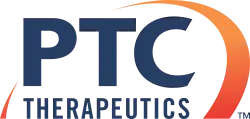PTC Therapeutics
PTC Therapeutics is a US pharmaceutical company focused on the development of orally administered small molecule drugs and gene therapy which regulate gene expression by targeting post-transcriptional control (PTC) mechanisms in orphan diseases.[1][2]
 | |
| Type | Public |
|---|---|
| NASDAQ: PTCT Russell 2000 Component | |
| Industry | Pharmaceuticals |
| Headquarters | , United States |
| Website | ptcbio |
In September 2009, PTC entered into an agreement with Roche for the development of orally bioavailable small molecules for central nervous system diseases.[3] In 2020, PTC announced the FDA approval of Evrysdi™ (risdiplam) for the treatment of spinal muscular atrophy (SMA) in adults and children 2 months and older, in partnership with the SMA Foundation and Roche.
PTC acquired the Bio-e platform in 2019. The Bio-e platform utilizes expertise in electron-transfer chemistry to modulate key biological processes beyond the reach of current drug development approaches. The lead compounds from the Bio-e platform, PTC743 and PTC857, target the enzyme 15-lipoxygenase – a key enzymatic hub that regulates the inflammation and oxidative stress that underpin mitochondrial disease and CNS pathology. Two pivotal studies will investigate the safety and efficacy of PTC743: a Phase 2/3 trial in refractory mitochondrial epilepsy and a Phase 3 trial in Friedreich’s ataxia.
Products
In 2017, PTC acquired Emflaza[4] (deflazacort) from Marathon Pharmaceuticals. PTC also owns Translarna, (Ataluren) marketed for nonsense mutation Duchenne muscular dystrophy.[5] Together, the two products generated revenues of 174 million dollars and 260 million dollars in 2017 and 2018 respectively.[6]
PTC has the commercialization rights for WAYLIVRA™ (volanesorsen) in Latin America. WAYLIVRA™ is approved in the European Union for the treatment of familial chylomicronemia syndrome (FCS). TEGSEDI® (inotersen) was granted marketing approval from the Brazilian Health Regulatory Agency (ANVISA) for the treatment of stage 1 or 2 polyneuropathy in adult patients with hereditary transthyretin amyloidosis (hATTR). PTC has licensed the commercialization rights for TEGSEDI® (inotersen) in Latin America from Akcea Therapeutics.
Pipeline
In 2018, PTC acquired Agilis Biotherapeutics and a gene therapy candidate, GT-AADC, with its compelling clinical data in treating aromatic L-amino acid decarboxylase (AADC) deficiency. AADC deficiency is a rare CNS disorder arising from reductions in the enzyme AADC that result from mutations in the dopa decarboxylase (DDC) gene.
In 2020, PTC acquired Censa Pharmaceuticals, Inc., a biopharmaceutical company focused on the development of CNSA-001 (sepiapterin), a clinical-stage investigational therapy for orphan metabolic diseases, including phenylketonuria (PKU) and other diseases associated with defects in the tetrahydrobiopterin (BH4) biochemical pathways diagnosed at birth.
References
- Bhutta, Sunya (December 2013). "Biopharma Blossoming in the Garden State". Biobusiness. Gen. Eng. Biotechnol. News. 33 (21). p. 15.
- Bain, Lisa J (2006). "Drug development in critical times". NeuroRx. 3 (4): 540–3. doi:10.1016/j.nurx.2006.08.004. PMC 3593415. PMID 17044149.
- Bratulic, Anna (2009-09-02). "Roche, PTC Therapeutics to partner on CNS drug discovery - FirstWord Pharma". FirstWord Pharma. Retrieved 2016-05-14.
- House, SA Editor Douglas W. (2017-03-16). "PTC acquires DMD med Emflaza from Marathon Pharma for up to $190M". Seeking Alpha. Retrieved 2018-07-03.
- "In The Spotlight: PTC Therapeutics". NASDAQ.com. 2018-07-23. Retrieved 2018-07-24.
- "In The Spotlight: PTC Therapeutics". NASDAQ.com. 2018-07-23. Retrieved 2018-07-24.
Further reading
- Schneider, Ilene (2009). "Firm Aims to Regulate RNA in Rare Diseases". Genetic Engineering & Biotechnology News. 29 (8): 14. Retrieved 2009-04-25.